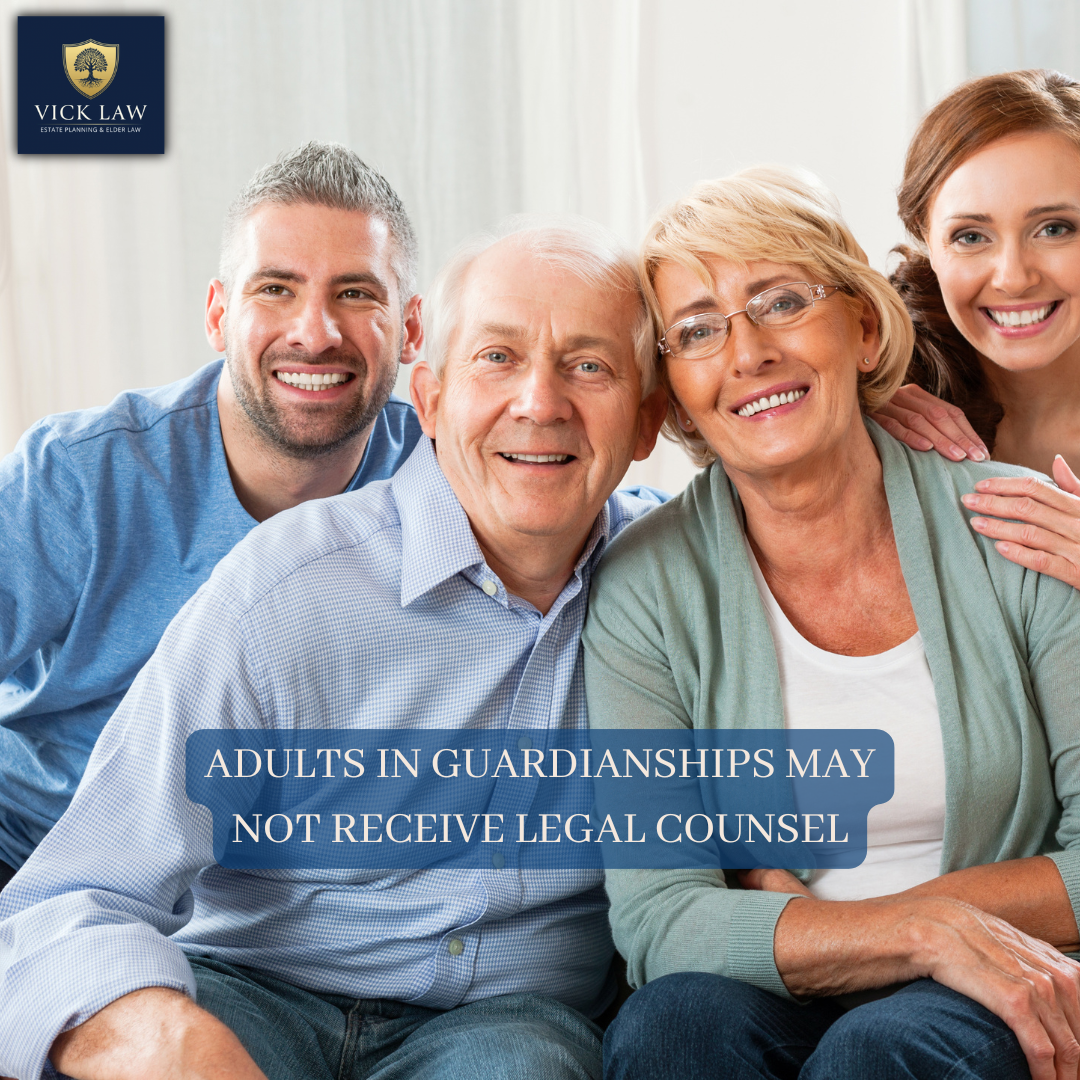Imagine losing the ability to make decisions about your finances, healthcare, or even where you live—without having anyone to advocate for you. According to Adults in Guardianships Often Never Receive Legal Counsel , yhis is the harsh reality for many adults placed under guardianship without access to legal counsel. Guardianship, while intended to protect vulnerable individuals, can sometimes strip people of their independence unnecessarily, leaving them at risk of exploitation or abuse.
Without proper legal representation, individuals may be forced into overly restrictive guardianships, preventing them from living a life of autonomy and dignity. At Vick Law, we believe no one should face this process alone.
The Role of Elder Law Legal Representation in Guardianship
Legal representation is crucial in guardianship cases, as it ensures that the individual's rights and preferences are considered during the process. An elder lawyer can help by:
- Advocating for the least restrictive options: Instead of full guardianship, alternatives like supported decision-making or power of attorney may better suit an individual’s needs. An attorney can present these options in court, reducing the potential loss of autonomy for the individual.
- Ensuring fair process and rights protection: With a lawyer, individuals are more likely to receive fair treatment, with proper procedures followed and their preferences respected.
- Providing ongoing support: Legal counsel can also assist with periodic reviews of the guardianship arrangement, helping to adjust the terms or even dissolve the guardianship if the individual regains capacity.
When adults in guardianship lack legal representation, they are at a greater risk of experiencing overly restrictive arrangements that might unnecessarily limit their independence. Without an advocate, their voices and preferences may be overlooked in decisions about their living arrangements, finances and healthcare.
The Consequences of Guardianship without Legal Counsel
When adults enter guardianship without legal counsel, several adverse outcomes can arise:
- Total loss of decision-making rights: Without representation, an individual might be placed under full guardianship, stripping them of all decision-making rights, even if less restrictive options were available.
- Difficulty modifying or ending guardianship: Guardianships are often challenging to reverse. Without an advocate to help with the legal processes, individuals may remain under guardianship longer than necessary.
- Increased risk of abuse and exploitation: Without oversight, guardians have extensive power over the individual’s finances, healthcare and personal matters. A lack of representation can make it easier for unscrupulous guardians to misuse this power.
Guardianship without legal representation, therefore, poses a serious risk of abuse and restricts individuals’ freedoms, especially in cases where they could retain partial or full decision-making ability.
Current Adult Guardianship Advocacy Efforts and Potential Reforms
Disability rights organizations and advocates are pushing for reforms to ensure that adults facing guardianship can access legal representation. Key proposals include:
- Mandatory legal representation: Some states are considering legislation to require legal counsel in guardianship proceedings, ensuring that individuals have advocates from the start.
- Regular review of guardianships: By mandating periodic reviews, the courts can reassess whether guardianship remains necessary or if a less restrictive alternative is appropriate.
- Increased oversight and accountability for guardians: Enhanced oversight helps prevent misuse of power and ensures that guardians act in the best interest of those they represent.
Alternatives to Full Guardianship for Adults with Special Needs
In some cases, full guardianship may not be necessary. Less restrictive options can provide the support individuals need. By working with an elder law or special needs planning attorney, families can pursue alternatives, including:
- Supported Decision-Making: Supported decision-making allows individuals to retain decision-making power, while receiving guidance from trusted supporters. This model provides support without sacrificing autonomy.
- Power of Attorney: Granting a power of attorney enables an individual to appoint someone they trust to make decisions on their behalf without relinquishing control over all aspects of their life.
- Conservatorship: A conservatorship arrangement allows a court-appointed individual to manage financial decisions, while the person retains control over personal matters. This alternative offers flexibility and preserves more independence.
No one should face guardianship proceedings without the protection of legal representation. At Vick Law, we are here to advocate for your rights and guide you through the complexities of guardianship and elder law.
📞 Call us today to schedule a consultation and explore how we can protect your independence or the rights of a loved one. Together, we can create a plan that ensures safety, dignity, and autonomy.
Key Takeaways
- Legal counsel is essential in guardianship cases: Proper representation can advocate for the least restrictive options, protecting individuals’ rights and autonomy.
- Lack of representation leads to greater risks: Without a lawyer, individuals face a higher chance of overly restrictive guardianships, prolonged arrangements and possible exploitation.
- Advocacy efforts are pushing for reform: Organizations and legal advocates are calling for mandatory representation, increased oversight and periodic review of guardianships.
- Alternatives to full guardianship protect autonomy: Options like supported decision-making, power of attorney and conservatorship can provide the necessary support without compromising independence.
Reference: Disability Scoop (Oct. 22, 2024) “Adults in Guardianships Often Never Receive Legal Counsel”

